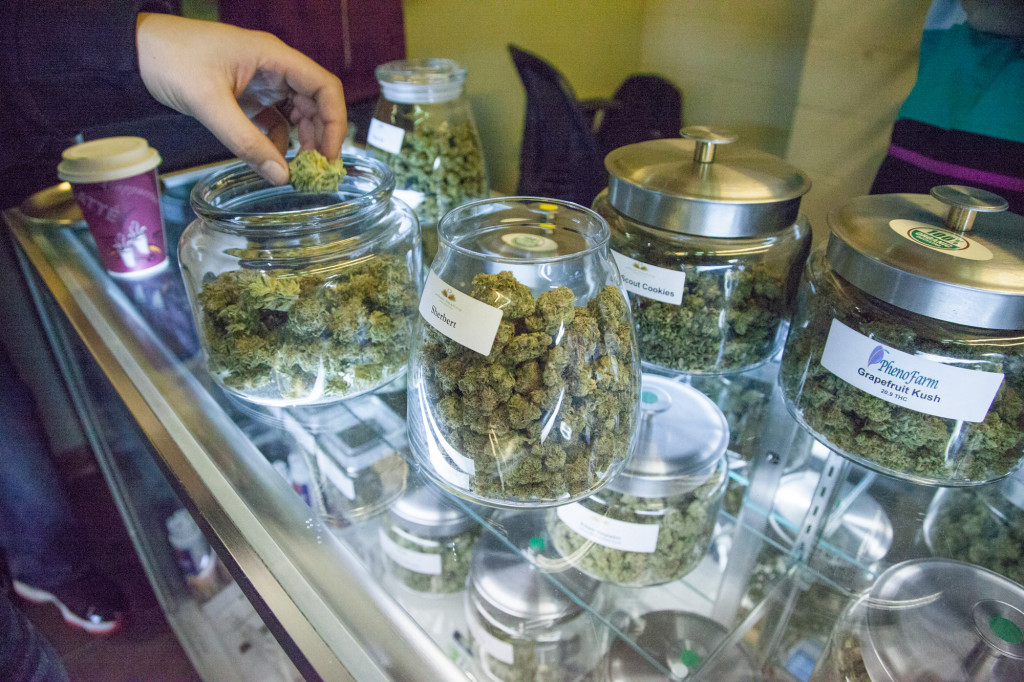Mary Jane is rolling into town, pass it on.
When Initiative-502 passed last year, the commercial sale and recreational use of marijuana was made legal in the state of Washington.
By the end of December 2013, the Washington State Liquor Control Board (WSLCB) finalized its set of rules for the implementation of I-502 and the steps toward seeing marijuana retailers have started to take place.

Patrons look through buds at the NW Cannabis Market. Due to the passing of 502, weed is now available for recreational use for people over the age of 21.
Patrons look through buds at the NW Cannabis Market. Due to the passing of 502, weed is now available for recreational use for people over the age of 21.
By now, all applications for producing processing and retailing licenses have been submitted and the state will soon be awarding those licenses by allocating the allowed 334 retailers statewide to different counties and cities based on population. Seattle will receive 21 of those retailer licenses.
Since the commercial sale of recreational marijuana is still illegal at the federal level, the WSLCB made a very strict set of rules and regulations in order to allow Washington to proceed with this new initiative without interference from the federal government. As far as licensing goes, certain criteria must be met by both the applicant and the proposed location of the retailer.
“Every applicant must pass the residency and location requirements,” said Brian Smith, WSLCB communications director. “The applicant and anyone they are connected with who might benefit from sales must have been a Washington resident for three months or more and must pass a criminal background check. However there will be an allowance made for people who have misdemeanors for marijuana possession.”
As far as location goes, no retail location may be within 1,000 feet of any school, library, playground or park. The goal is that all retailers will be away from youth. This is mostly because the rules of I-502 were based around current rules for alcohol in which no minor may be allowed to purchase the product.
People will also have the right to ban marijuana retailers in their community. Therefore, even if a license is granted, there is no guarantee retailers will be able to set up shop.
Thanks to Seattle University, Seattle Central Community College, Cal Anderson Park as well as other schools and public locations, it will be very unlikely for any location on Capitol Hill to receive a retail license.
“We wouldn’t say that any area is blocked off,” Smith said. “But I have seen some maps of Seattle and it is so dense in the Capitol Hill area that it will be very difficult.”
There will most likely be no marijuana retailers opening up near Seattle U.
“I think it makes sense as a rule, but the result seems to be counter-productive since Capitol Hill is where a large portion of the population of marijuana users reside,” said Seattle U senior Chloe Bodine. “But I don’t think it will stop anyone from buying if they want to do so.”
It should be interesting to see where the retailers sprout up as several businesses have applied for retailer licenses including Cupcake Royale located in the Capitol Hill area. However the founder Jody Hall recently told The Seattle Times that she submitted the Cupcake Royale location on Capitol Hill as a placeholder, hoping she would find a more suitable location later on. She didn’t.
Another problem for companies like Cupcake Royal is that the retail license requires the business to strictly sell marijuana and marijuana-related goods. They would not be allowed to diversify their products by selling marijuana infused and non-marijuana infused goods.
Another set of rules by which retailers must abide is that they cannot package or open the marijuana themselves. They must strictly act as a retailer for state-issued products that come in child-safe packaging.
Washington will be issuing 40 metric tons of marijuana to the selected retailers to sell in the first year.
“Consultants said we can hope to get 25 percent of the market by the end of this year,” Smith said.
For now, the WSLCB anticipates that the legal selling of marijuana will begin in June of this year. First they must award the 334 licenses. If there are more qualified applicants to a particular region than the amount of licenses allocated to that region, there will be a lottery to decide which retailers will receive the license.
Washington and Colorado are the first states to legalize the commercial sale of recreational marijuana and it will certainly be interesting to see how the initiative plays out and if similar laws begin to take effect in other states.
“It’s a big deal,” Smith said. “We are like pioneers here as there is no blue print for us to follow. We are just trying to carry out the will and spirit of the initiative.”












